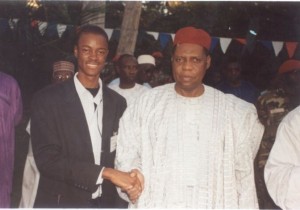
Goal.com talks to a remarkable young man and not just because he used to work for the site!
By Clyde Tlou
Ibrahim Dabo has crammed a great deal in to his young life. The former African Editor of Goal.com fled war-torn Sierra Leone in 1997 and is now making a successful life in the United States.
Football is very much a part of that life, as Ibrahim tells Clyde Tlou of Goal.com Africa.
You left Sierra Leone in 1997 as a result of war. Tell us about this aspect of your life – why did the rebels invade and what was it like living as a refugee?
I really do not know what triggered the start of the war. I left Sierra Leone in 1997, after the rebels invaded the capital city Freetown. I was very young at the time – 13-years-old. In Freetown, they overthrew the democratically elected government.
There was instability and chaos. The risk of being abducted by rebels frightened me a lot. In May of 1997 I fortunately escaped, leaving the country by sea en-route to The Gambia, alongside my brother. That was yet another ordeal – spending five horrible days at sea.
The boat in which we travelled, with about 650 people onboard, almost sank in the middle of the Atlantic Ocean as the waves went wild during our penultimate day at sea.
We ran out of food and water, the captain lost his route, the communication system on the boat broke, one engine went down and we were running on only one. There was also an outbreak of cholera. People joined hands and prayed; it was very scary.
It’s a long story. On the other hand, you can imagine what it means going to a country you’ve never visited before and wondering what to expect – different culture, among other things.
Upon arrival, the boat anchored away from the Gambia harbour. The navy boats came in and officials from the Gambia Red Cross brought us food and drink. What a relief it was. I appreciated that a lot.
Early in the morning, a screening process began as people were transported via the navy boats to land. My brother and I were among the last people to leave the boat that day, late in the evening, and we were taken straight to the hospital. We were later taken to the Red Cross office, were many other refugees were gathered.
We had to undergo a registration process and after a while some family members who I had never met – The Basiru Jawara family – found out that we were with the Red Cross. They came looking for us and agreed to provide us shelter. We forever remain very grateful for their generosity.
A few months later I enrolled at the Gambia Senior Secondary School, graduated in 1999. Despite the challenges in Gambia, I had to adapt and make new friends. I registered with the United Nations High Commission for Refugees (UNHCR), and tried hard not to let the bitter memories of war severely impact my future.
But, it was disheartening to have lost a lot of family members and to deal with the fact that hundreds of thousands of lives were lost. Thousands of people had their limbs viciously hacked-off by the rebels.
Those memories have greatly inspired me to focus on humanitarian and philanthropic roles. I plan to help victims of civil war, and I’ve already got a lot of support.
Since my days with Goal.com [Ibrahim started way back in 2000], I’ve always spread the message of peace through my writing, as well as through my speaking engagements. Read entire interview on Goal.com.
